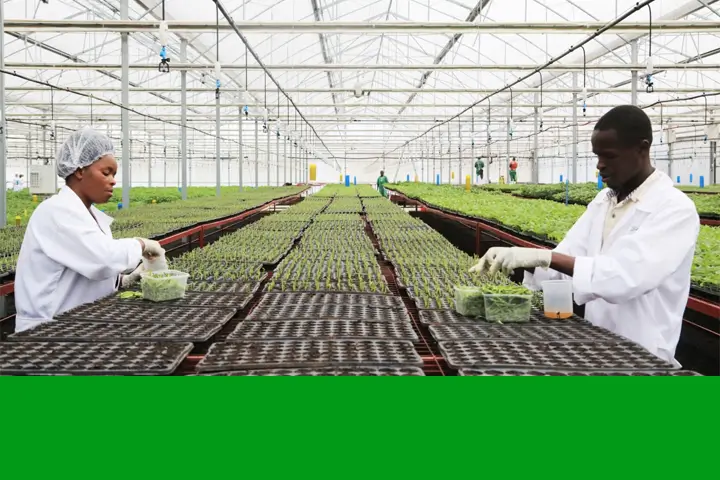
On August 2, Parliament took a significant step towards ensuring the safety and integrity of Rwanda’s environment and biodiversity by approving a draft law governing biosafety. This milestone legislation aims to address potential risks associated with genetically modified organisms (GMOs) while also paving the way for the development and application of biotechnology in the country.
The draft law, which consists of five chapters and 34 articles, will now undergo further scrutiny by a responsible parliamentary committee before being put to a vote in the Lower House’s Plenary Sitting. The goal is to establish a comprehensive regulatory framework to guide the handling, use, and movement of GMOs, thereby protecting both human health and the nation’s rich natural resources.
GMOs encompass a broad range of living organisms, including crops and livestock animals, which have had their genetic makeup altered through genetic engineering methods. This manipulation often introduces beneficial traits, such as pest resistance, tolerance to extreme environmental conditions, and enhanced nutrient levels, among others.
Rwanda’s Vision 2050, which aims to elevate the quality of life for all Rwandans and achieve upper middle-income and high-income country status by 2035 and 2050, respectively, emphasizes the importance of biotechnology in attaining these ambitious goals. Consequently, the country has been witnessing significant advancements in genetic engineering applications, especially in pharmaceuticals, industrial materials, and agriculture.
However, with the advancement of biotechnology, concerns have arisen about the potential risks associated with GMOs. These risks could have adverse effects on biological diversity, human health, and the overall sustainability of Rwanda’s environment. To address these concerns, the draft law on biosafety outlines key provisions that will help manage the use and introduction of GMOs in the country.
Key Provisions of the Draft GMO Law:
- Scope of Application: The law applies to the transboundary movement, transit, and use of all living modified organisms that may pose risks to biological diversity and human health. It specifically excludes GMOs used as pharmaceuticals for human use, which are governed by other laws.
- National Biosafety Committee: A National Biosafety Committee will be established to review applications related to GMOs and provide expert advice to the environmental management authority, referred to as the Authority in the bill. The committee may form sub-committees to offer technical assistance if needed.
- Institutional Biosafety Committees: Persons seeking to conduct contained use and confined field trials must adhere to the requirements set forth by Institutional Biosafety Committees. These committees assess and approve works categorized as minimal risk and low risk and provide copies of approvals to the Authority.
- Permit Application: Various activities related to GMOs, including confined use, confined field trials, intentional introduction into the environment, market placement for food/feed processing, import, transit, export, and handling, packaging, labeling, transportation, or storage, require a permit issued by the Authority.
- Risk Assessment: Applicants for GMO-related activities must conduct mandatory risk assessments to evaluate potential risks to human health and the environment. The Authority will establish guidelines for conducting these assessments.
- Risk Management: Those engaged in activities related to GMOs must develop and maintain risk management plans and post-release monitoring strategies. The Authority will provide guidelines for these plans.
- Review of Risk Assessment Reports: The National Biosafety Committee reviews risk assessment reports and provides recommendations to ensure the safe use of GMOs.
- Exemption: The Authority may exempt certain GMOs from risk assessment and management requirements if there is sufficient experience or information indicating minimal risk to human health and the environment.
- Faults and Sanctions: Violations of permit terms, mishandling of GMOs, provision of false information, or deceptive practices may result in administrative fines ranging from Rwf1 million to Rwf5 million.
- Offences and Penalties: Serious offences, such as unauthorized field trials, withholding critical information, using GMOs for unethical purposes, and obstructing the Authority’s functions, may lead to imprisonment for three to five years and fines between Rwf10 million and Rwf20 million.
The draft law on biosafety is a crucial step forward in Rwanda’s commitment to safeguarding its environment, biodiversity, and public health while encouraging responsible biotechnological advancements. By establishing a robust regulatory framework, Rwanda is poised to harness the potential benefits of genetic engineering while mitigating potential risks associated with GMOs. As the bill progresses through the legislative process, Rwanda continues to demonstrate its dedication to sustainable development and responsible biotechnological practices.
Original Article written by Emmanuel Ntirenganya for New Times Rwanda
Stay updated with the latest farming tips and agriculture industry news from Africa by subscribing to our newsletter. Don’t miss out on valuable insights and updates. Follow us on Twitter, LinkedIn, and Facebook to join our farming community and stay connected with us.



















